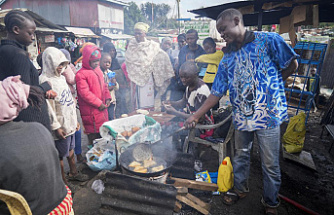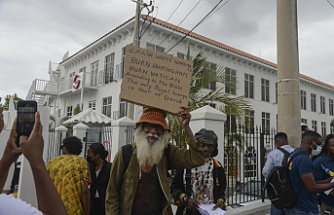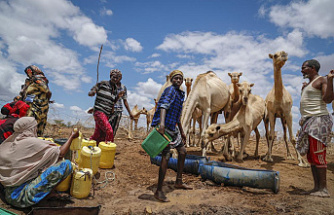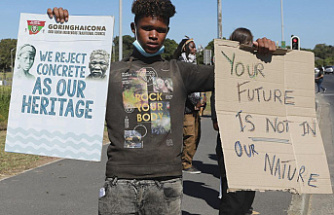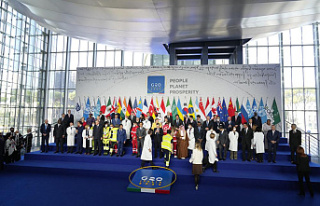The shootings took place despite repeated appeals from the West to Sudan's military rulers to be restrained and allow peaceful protests.
In protest of Monday's coup attempt, thousands of Sudanese took to the streets with drums and whistles, chanting "revolution, revolution", in protest.
Pro-democracy groups called for demonstrations throughout the country in order to press for the re-institution of a transitional government that was ousted and for the release from detention of senior political figures.
The United States and United Nations warned Sudan's strongman Gen. Abdel-Fattah Burhan that they see the military's treatment the protesters as a test and called for restraint.
Burhan claimed that democracy will continue even though the military took over, and promised to install a new technocrat government. Pro-democracy activists in Sudan fear that the military will not relinquish its control and will appoint any politicians it can control.
Protests on Saturday were likely to intensify pressure on generals, who are facing increasing condemnations from the U.S. as well as other Western countries for their efforts to restore a civilian-led government.
Saturday afternoon saw large crowds gather in Khartoum, the capital of Khartoum, and Omdurman, its twin city. Marchers shouted "Give It Up, Burhan" and "revolutionary revolution." Others held banners that read, "Going backwards is impossible."
The Sudanese Professionals Association and the so-called Resistance Committees called the demonstrations. They were both at the forefront in an uprising that overthrew Omar al-Bashir, a long-serving autocrat, and his Islamist government in 2019.
They call for the demise of Burhan's military council and the transfer of power to civilians. They also demand the dismantling and restructuring of paramilitary organizations and the military, intelligence, and security agencies. They demand the removal of all officers who are loyal to al-Bashir.
According to the Sudan Doctors Committee, one of the protesters who were killed in Khartoum's twin-city of Omdurman on Saturday was shot in the head and the other in the stomach.
This committee is part of Sudanese Professionals Association. It stated that security forces used live ammunition against protesters in Omdurman and around the capital. The committee said that unspecified numbers of protesters were also injured.
Mohammed Yousef al-Mustafa spoke for the professional association and said that tear gas was used against protesters who tried to cross the Manshia Bridge across the Nile River to reach Khartoum’s downtown.
He stated, "No power-sharing mediation will be done with the military council again." "They (the generals), have failed to transition and instated coup."
Al-Mustafa spoke to The Associated Press by phone as he participated in the Khartoum's Manshia protest.
Prior to the protests began, major roads and bridges connecting Khartoum's neighborhoods were blocked by security forces. The security was tight in downtown Khartoum and outside the military headquarters, which was the location of a major sitin camp during the 2019 uprising.
Daily street protests have been ongoing since the military takeover. According to activists and the Sudan Doctors Committee, Saturday's shooting resulted in 11 people being killed by security forces since the coup. According to the U.N., at least 170 more people have been injured.
There were concerns that security forces might resort to violence again to disperse protesters. Live ammunition, rubber bullets, and tear gas have been fired at protestors since Monday's coup. They beat protestors with whips and sticks.
Representatives from the U.N. as well as the U.S. urged the military not to act out of control.
On Friday night, Volker Perthes (the U.N. special representative for Sudan) met with Gen. Mohammed Hamdan Dagalo. Dagalo is a leader in a coup that was seen as being close to Burhan. Dagalo is the commander of the paramilitary Rapid Support Forces which controls Khartoum's streets and played a key role in the coup.
He stated that the U.N.'s Transition Mission "is actively coordinating mediation efforts currently underway in order to facilitate an inclusive dialog, which remains the only way to a peaceful resolution to the current crisis."
According to a Sudanese military official, a U.N.-supported National Committee met separately with Prime Minister Abdalla Hamdok (Gen. Burhan) Saturday in an effort to find common ground to resolve the dispute.
According to the official, Hamdok demanded that all political and government officials arrested since the coup were released. Burhan, according to the official, initially approved the release of "most" of those detained but refused the release of Khalid Omar (Minister of Cabinet Affairs), because they are accused of inciting rebellion.
Because he was not authorized to release the information, the official spoke under anonymity.
Clement Nyaletsossi Voule (the U.N. special raporteur on freedom of peaceful assembly or association) also called for security forces to refrain from violence against protesters. They will be held accountable for excessive force used against protesters. He warned that we are monitoring.
Burhan claimed that the takeover was necessary in order to stop a civil war. He cited growing divisions between political parties. The takeover occurred less than a month after he was due to hand power over to civilians.
Burhan was elected head of the military council that will govern Sudan until 2023 elections. Burhan, in an interview with Russia’s state-owned Sputnik news station published Friday, said that he would soon name a premier to form a Cabinet which will share the leadership of the country with its armed forces.
According to observers, it is unlikely that the military will allow civilian rule.


